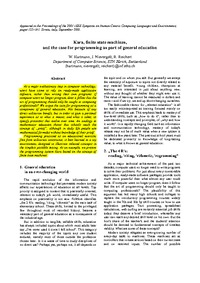Kara, finite state machines, and the case for programming as part of general educationErstpublikation in: Symposia on Human-Centric Computing Languages and Environments
Publikationsdatum:
|
 |
 Zusammenfassungen
Zusammenfassungen


 As a major evolutionary step in computer technology,
users have come to rely on ready-made application
software, rather than writing their own programs. If
computer users no longer program, does it follow that the
art of programming should only be taught to computing
professionals? We argue the case for programming as a
component of general education. Not because of any
direct utilitarian benefit, but in order to gain a personal
experience as to what it means, and what it takes, to
specify processes that evolve over time. An analogy to
mathematics education shows that schools teach the
concept of „proof“, although in daily life people use
mathematical formulas without knowledge of their proof.
Programming practiced as an educational exercise,
free from utilitarian constraints, is best learned in a toy
environment, designed to illustrate selected concepts in
the simplest possible setting. As an example, we present
the programming system Kara based on the concept of
finite state machines.
As a major evolutionary step in computer technology,
users have come to rely on ready-made application
software, rather than writing their own programs. If
computer users no longer program, does it follow that the
art of programming should only be taught to computing
professionals? We argue the case for programming as a
component of general education. Not because of any
direct utilitarian benefit, but in order to gain a personal
experience as to what it means, and what it takes, to
specify processes that evolve over time. An analogy to
mathematics education shows that schools teach the
concept of „proof“, although in daily life people use
mathematical formulas without knowledge of their proof.
Programming practiced as an educational exercise,
free from utilitarian constraints, is best learned in a toy
environment, designed to illustrate selected concepts in
the simplest possible setting. As an example, we present
the programming system Kara based on the concept of
finite state machines. Dieser Text erwähnt ...
Dieser Text erwähnt ...
 Personen KB IB clear | Kent Beck , Joseph Bergin , Dietrich Boles , Peter Brusilovsky , Eduardo Calabrese , Allen Cypher , Jay Fenton , Werner Hartmann , Jozef Hvorecky , Ken Kahn , Anatoly Kouchnirenko , Philip Miller , Jürg Nievergelt , Seymour Papert , Richard E. Pattis , Raimond Reichert , Jim Roberts , David Canfield Smith , Jim Spohrer , Mark Stehlik | ||||||||||||||||||||||||||||||||||||||||||||||||||||||
 Fragen KB IB clear | Gehört Programmieren zur Allgemeinbildung?Should programming be part of general education? | ||||||||||||||||||||||||||||||||||||||||||||||||||||||
 Begriffe KB IB clear | Allgemeinbildunggeneral education
,  Kara
, Kara
,  Programmieren Programmieren programming
, programming
,  Software Software software software
| ||||||||||||||||||||||||||||||||||||||||||||||||||||||
 Bücher |
| ||||||||||||||||||||||||||||||||||||||||||||||||||||||
 Texte |
|
 Zitationsgraph
Zitationsgraph
 Zitationsgraph (Beta-Test mit vis.js)
Zitationsgraph (Beta-Test mit vis.js)
 Zeitleiste
Zeitleiste
 6 Erwähnungen
6 Erwähnungen 
- Theory of Computation as a Vehicle for Teaching Fundamental Concepts of Computer Science - Thesis 15035, ETH Zürich, D-INFK, May 2003 (Raimond Reichert) (2003)



- On the Learning in E-Learning (Raimond Reichert, Werner Hartmann) (2004)


- DeLFI 2008 - 07. - 10. September 2008 in Lübeck, Germany (Silke Seehusen, Ulrike Lucke, Stefan Fischer) (2008)
- CrePes - Warum und wie Schüler ab 8 Jahren Programmieren lernen sollten (Markus Esch, Patrick Gratz, Steffen Rothkugel, Jörg Jakoby, Ingo Scholtes, Peter Sturm) (2008)


- CrePes - Warum und wie Schüler ab 8 Jahren Programmieren lernen sollten (Markus Esch, Patrick Gratz, Steffen Rothkugel, Jörg Jakoby, Ingo Scholtes, Peter Sturm) (2008)
- Autorenwerkzeuge für digitale, multimediale und interaktive Lernbausteine im Web 2.0 (Michael Hielscher) (2013)



- Informatics in Schools: Fundamentals of Computer Science and Software Engineering (Sergei Pozdniakov, Valentina Dagienė) (2018)


- Digitalisierung in der Bildung - ein Kinderspiel? (2025)



 Volltext dieses Dokuments
Volltext dieses Dokuments
 |  Kara, finite state machines, and the case for programming as part of general education: Artikel als Volltext ( Kara, finite state machines, and the case for programming as part of general education: Artikel als Volltext ( : :  , 431 kByte; , 431 kByte;  : :  2021-03-21) 2021-03-21) |
 Anderswo suchen
Anderswo suchen 
 Beat und dieser Text
Beat und dieser Text
Beat war Co-Leiter des ICT-Kompetenzzentrums TOP während er Dieser Text ins Biblionetz aufgenommen hat. Die bisher letzte Bearbeitung erfolgte während seiner Zeit am Institut für Medien und Schule. Beat besitzt kein physisches, aber ein digitales Exemplar. Eine digitale Version ist auf dem Internet verfügbar (s.o.). Es gibt bisher nur wenige Objekte im Biblionetz, die dieses Werk zitieren.















 Biblionetz-History
Biblionetz-History